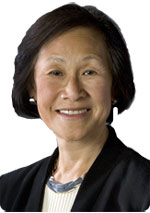Permanente way
- 28 May 2009
 |
|
Dr Louise Liang, |
Kaiser Permanente, the US healthcare organisation often held up as a model for the NHS, is making rapid progress with electronic patient records and generating efficiencies and savings in the process. Jon Hoeksma reports on a presentation given by one of its key executives at a conference organised by right-wing think-tank 2020health.
It’s one of the largest health IT programmes in the world, designed to connect health professionals in hospital and GPs to shared electronic patient records.
The ambitious project also aims to put patients in charge of their health by providing them with online access to their health information and services such as secure email consultations with their GP.
The programme got off to slow start, had to re-award contracts and began implementation from 2004, but the finish line is now in sight and proven benefits can be shown. Sound familiar?
Think again, the organisation in question is leading US health scheme Kaiser Permanente – which says it will complete the final phases of digitising its healthcare system by spring 2010.
Strategic investment
With 8.7m members, 36 hospitals and 14,000 directly employed physicians, Kaiser has annual revenues of $40 billion. It has long been held up as an exemplar by UK policy experts and industry wonks.
It was, for example, extremely influential in shaping the government’s decision to invest in England’s National Programme for IT in the NHS.
Kaiser’s 2002 decision to make a heavy investment in electronic patient records, in a project called Kaiser Permanente Health Connect, was a strategic move, intended to enable the organisation to change the way it could deliver healthcare, making it safer and more efficient.
Speaking at a 2020health seminar in London recently, Dr Louise Liang, senior vice president of quality and clinical systems support, gave an overview of the programme.
She said Kaiser is now able to show clear clinical and business benefits from its strategic decision, including a 26% reduction in doctors’ office appointments.
It has published research in the journal Health Affairs showing that 3m of its members have made use of e-mail consultations with their family physician.
Dr Liang said that when minors and people for whom e-consultations would be inappropriate were stripped out of the figures, they showed that 47% of members who would be eligible had made use of the service.
“We find that patients who use secure email messaging make 7-10% less physician office visits and make fewer phone calls,” she added.
Scheduled telephone visits have also increased eightfold and secure email messaging risen sixfold. “We’ve also added a lot of patient education and support tools online, such as a very successful renal support tool,” said Dr Liang.
Other huge benefits were being seen through patient driven online programmes, in areas such as smoking reduction, weight and stress.
Executive support
Dr Liang said executives from NHS Connecting for Health had looked at the programme to see what lessons they could learn. She said her key message to anyone looking to emulate Kaiser was to have top level, sustained leadership and support.
Kaiser’s chief executive made the digitisation project the organisation’s number one strategic priority for four years in a row. Dr Liang stressed that senior executives also had to take responsibility; but that this needed to be underpinned by widespread involvement in decision making.
“It’s absolutely essential to involve clinicians and physician leadership in all decisions, not just the ones where someone thinks there is a clinical element,” she said. “They are all clinical decisions.”
Focus on the consumer and cost
Dr Liang said that Kaiser began in 2002 with a vision of where it wanted to get to; consumer-focused care that was both seamless and high quality. This vision was then effectively communicated to all in the organisation, with the development of electronic patient records forming the bedrock of the project.
The organisation also decided that its existing IT strategy “would not get us to where we needed to be.” Having drawn up a new strategy and awarded contracts – with IBM and Epic Systems featuring prominently – implementation work began in 2004.
“Four years later, we have completed everything expect ten hospitals, which will happen by early 2010,” said Dr Liang.
Building the Health Connect EHR has involved replacing almost all business systems and some clinical and departmental systems, although the majority were left in place and connected through integration. All these systems are underpinned by a data warehouse.
In addition, the roll out of the KP.org personal health record began in Hawaii in 2005. “KP.org is our version of the NHS’s Health Space,” Dr Liang told the conference organised by 2020health, a centre-right think tank, to discuss how IT could deliver improved patient outcomes.
The web-access portal enables members to manage their health plans, schedule appointments, create personal health records, order prescription refills and email their doctor.
Central and local
On the question of how much needs to be “uniform”, Dr Liang said the answer was not much. She said Kaiser had kept centrally made decisions on mandating data and systems to the essential minimum, about 15%, with the rest of decisions made by local organisations.
“The other 85% we didn’t need to care about,” said Dr Liang. The focus at the centre was on ensuring a standardised data model and interoperability. “I hardly made any decisions about choosing systems at all,” said Dr Liang.
The quid pro quo was that people were told they had to make a decision quickly, then live with it and make it work. It is a mistake to look at such an ambitious programme as a single IT project, said Dr Liang. “It’s not one IT project but a federated way of doing things.”
Link



